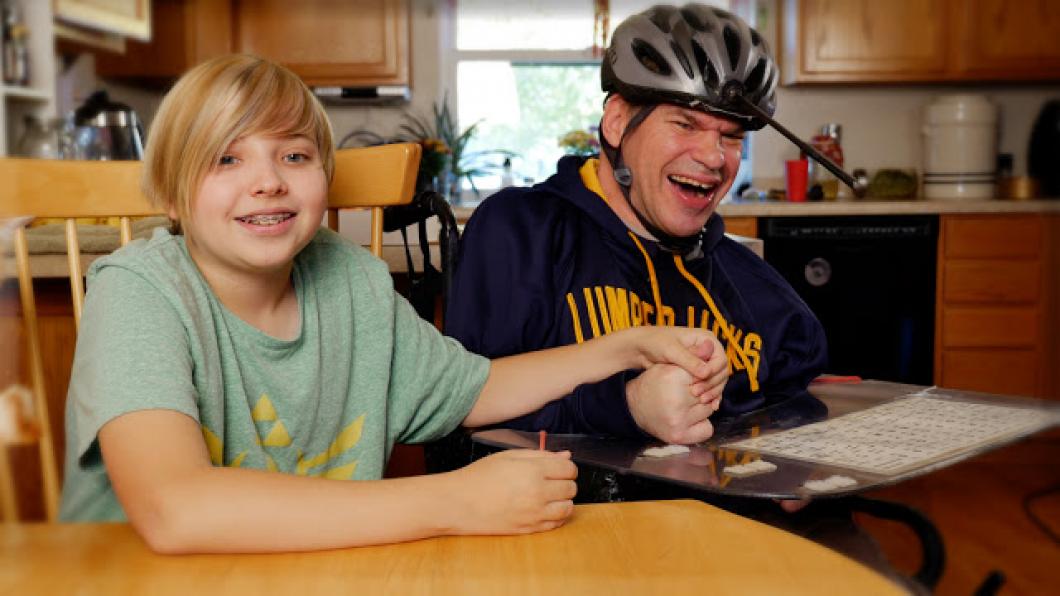
'He's a pretty normal dad'
By Louise Kinross
“When I was seven, I asked when I was going to get my chair,” says Elijah Wangeman, 14 (above left), in an unedited version of My Dad Matthew. The six-minute film is about Elijah’s life with his dad Matthew (right), who has cerebral palsy, uses a wheelchair and communicates by moving a pointer on his helmet to letters on a board. For Elijah, Matthew is “a pretty normal dad.” So as a child, Elijah says he imagined that he too would use a wheelchair when he got older. Matthew is a professor in disability studies at Northern Arizona University. That’s where Matthew met filmmaker John Schaffer, when John was studying special education. On Thursday Feb. 23 at 9 p.m. Eastern time, John is live streaming the world premiere of his film My Dad Matthew on Facebook. John says he hopes viewers take away “a new perspective on disability.” BLOOM interviewed Matthew by e-mail.
BLOOM: What do you teach at Northern Arizona University and why?
Matthew Wangeman: I teach disability studies and I absolutely love it! My job is to essentially challenge how my students think about disability. In fact, we developed the disability studies minor about 10 years ago to combat what people with disabilities and their family members said was the greatest barrier they faced in Arizona—the attitudes of others towards people with disabilities. I really feel I’m doing my life’s work at Northern Arizona University. What keeps me going is when I hear my students talk in the senior seminar course that I co-teach—it’s like they are completely different people. They really think about disability as a problem with society not being willing to really embrace people who are different. To me, that is how you begin to change society for the better for people with disabilities.
BLOOM: What was the greatest challenge growing up with your disability?
Matthew Wangeman: Probably my greatest challenge was trying to convince my Mom that I really needed to go to college! I somehow knew education would be my only key to even have a chance to have control in my life. I always say I have been extremely fortunate in my life and often I think my path could have gone in so many bad directions. I could, and probably should, write a book about growing up in two residential schools for crippled children.
BLOOM: You seem to have a very open, humorous, joyful outlook on life. Do you have a philosophy that shapes the way you live?
Matthew Wangeman: Yes, I love to laugh and I love to make people laugh. I often say I’m a ‘sit-down’ comic. I just think with humour people open up more and they’re open to understand and really think differently about a subject. Life is way too short to live life too seriously and people just like being around funny and happy people.
BLOOM: You say attitudes can be most ‘disabling.’ Can you give us an example?
Matthew Wangeman: I have never had a job that pays me for what I am truly worth. I really feel that is because of attitudes of others towards me, because I have a significant disability. I went to one of the best universities on this planet and that was UC Berkeley.I even earned a masters of city planning and was in a PhD program at Berkeley that I didn't finish. Even if I had finished my PhD, I don't think it would have made a difference because of people's attitudes towards me as someone with a significant disability who can't orally speak.This will always frustrate me.
BLOOM: You have a significant physical disability but have achieved great success academically. How can we break through stereotypes about people who have an intellectual disability? Even in the disability community, intellectual disability is stigmatized?
Matthew Wangeman: Yes, this a problem and it shows people with disabilities are just as guilty of discrimination against other people with disabilities. We must practise what we preach, but humans are flawed people and in order to feel good about ourselves it seems we must put down other people.I really don't know how we fix it, but we must continue to confront this ugly problem.
BLOOM: I would like to see us change the way we view human value—so we don’t base it on what a person does—but see it as inherent to each person, simply by virtue of being human. Do you think people should have to ‘earn’ their value by being productive in a conventional way?
Matthew Wangeman: I happen to think the value that we place on people as part of a capitalistic society is probably one of the most harmful things we do to people with significant disabilities. People should never be judged by how much money they make, because it's so arbitrary.I love sports but it's ridiculous that someone would make $5-10 million dollars for hitting this round ball with a bat 400 feet!It makes no sense.
BLOOM: Your son Elijah provides a lovely perspective to the story. How have his insights impacted your thinking?
Matthew Wangeman: Probably what my son has taught me the most is disability to him is typical. I am not saying that he is free from discriminating against people, because we all discriminate, but I do think he is much more open to other people who are different and in that way we can learn from him.
BLOOM: What advice would you give to parents whose child has significant disabilities?
Matthew Wangeman: Just believe in your child and always question everything!